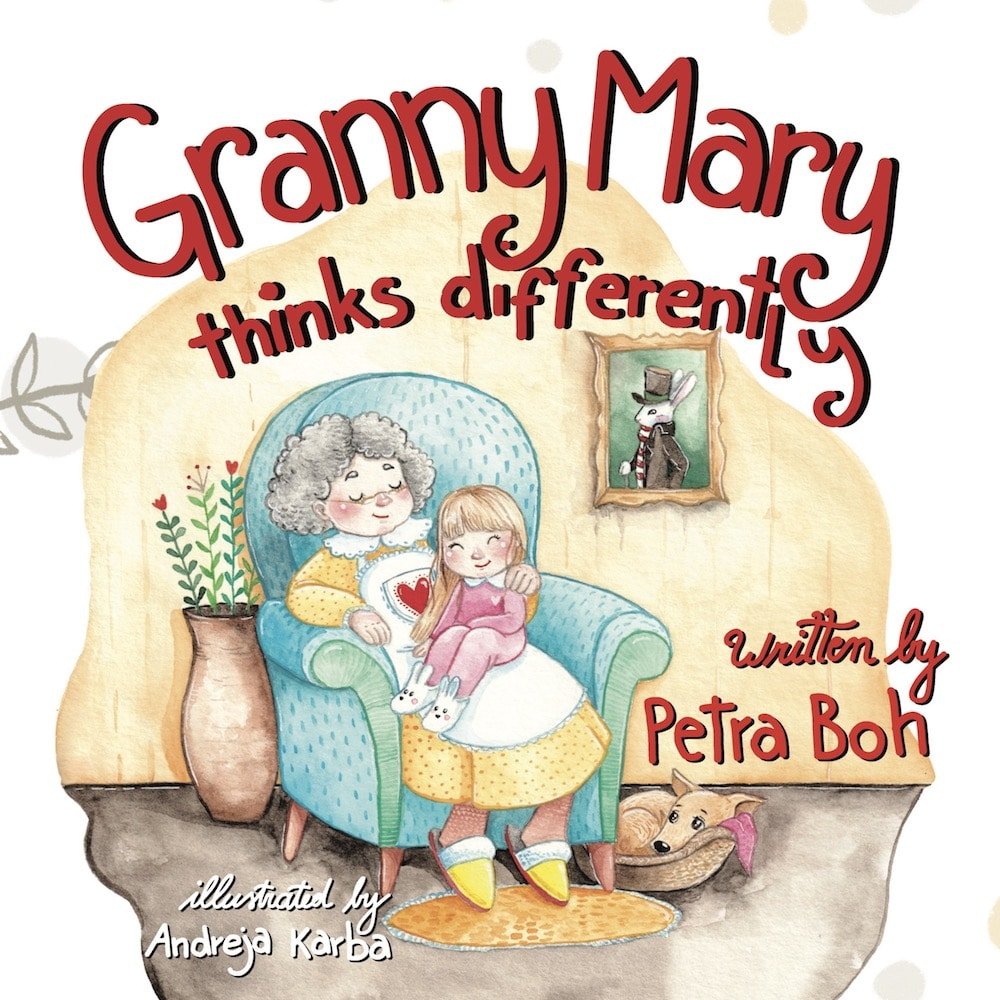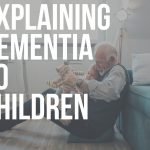Granny Mary Thinks Differently is an eBook for everyone in the family facing dementia.
Dementia is a syndrome that does not have a cure yet. Unfortunately, it affects every family member, including children.
It happens very commonly in families that we completely forsake explaining dementia to children. It is a challenging term for a child to understand. That’s why we need to teach them about the condition their grandparent is facing.
Very often, the child and the grandparent are best friends. However, when dementia occurs, their relationship can change drastically.
Sometimes, kids think it’s their fault, which can even lead to depression.
Contents
- Explaining Dementia to Children and Young People
- Granny Mary Thinks Differently
- Children’s world
- Dear Grandma, Grandpa
- Dear Granddaughter, Grandson
- Reviews & Comments – Granny Mary Thinks Differently
- Teepa Snow, MS, OTR/L, FAOTA
- Cameron J. Camp, Ph.D., Director of Research and Development, Center for Applied Research in Dementia
- Zvezdan Pirtosek, M.D., Ph.D.
- Laura Herman, Elder and Dementia Care Professional
- Teodora Ghiur, Cognitive Neuroscience
- Jana Mali, Ph.D., Associate Professor, Faculty of Social Work
- Related Posts
Explaining Dementia to Children and Young People
With lovely and educational children’s book, Granny Mary Thinks Differently, you can now educate your child about dementia conveniently.
Through carefully picked words and engaging illustrations, your child will understand that dementia is a disease.
They will learn that they are not guilty of a negative reaction from grandparents. The book will also help them stop having the feeling that grandparents no longer like them.

Tell your child when you feel sad, angry, tired, or in a bad mood because of your grandparent’s dementia.
Emphasize that the child is not to blame for your feelings and that he or she has done nothing wrong.
Talk to Children and Young People About Dementia
Additionally, allow the child to talk about their fears, concerns, and emotions related to the changes they observe and experience in grandparents or the family.
It is important that the child does not experience feelings of guilt. You should clearly explain to your child that no one in the family is to blame for the illness – dementia.
At the same time, we need to assure the child that he will not get dementia and that he should not worry about his future or his parents’ future (dementia is rarely hereditary).
If you teach a child about the disease (especially about the noticeable signs that he will easily notice), it will not affect him.
This especially applies to situations when the grandparent forgets his name, repeatedly asks the same question, will no longer want to read them a fairy tale, or even becomes angry at them.
The child will know that this is an expression of the disease. Not the fact that the grandparent no longer likes him/her.
We can also direct the child to preventive action like reading, exercise, quality sleep, learning, healthy eating.
In short, explaining what is good for the brain and how he/she should take care of his/her body to be healthy for as long as possible.
Knowledge is a cure (for the whole family) when we face dementia.
The more information and knowledge a child has about dementia, the easier it will be to find themselves in a new position. When you do not have the answers to all the questions, your child has asked you, find information and solutions together.
[su_button url=”https://gumroad.com/l/gmtdeb” target=”blank” style=”flat” background=”#52CA70″ color=”#FFFFFF” size=”7″ radius=”3″ text_shadow=”none” rel=”nofollow” ]Buy Granny Mary Thinks Differently[/su_button]
Granny Mary Thinks Differently
We discover dementia and get to know it through the childhood curiosity of Granny Mary’s granddaughter, Anna.

Hidden in the story are important questions about age, illness, family, friendship, and love, which gives us the strength and courage to cope with the changes that dementia brings to the family.
There are currently about 50 million people who have dementia globally.
The number keeps increasing by almost 10 million each year.
Thus, the topic is rapidly becoming more and more relevant, both on a daily basis and in children’s literature. Changes that come with the disease touch all family members.
Furthermore, everyone accepts the effects of dementia differently, so studying the condition carefully is very important, especially in children.
Children’s world
The book is dedicated to all families, but especially to the grandchildren of grandparents who think differently.
The heartiness and patience of Anna, the granddaughter of grandmother Mary, will invite you to the children’s world, which is often ignored and overlooked when we face illness – dementia – in the family.
By talking to a child in an understandable and acceptable way, we make them aware and influence the recognition and understanding of dementia in society.
Dear Grandma, Grandpa
Even if you forget everything, you will not be forgotten. Let this children’s book on dementia be a display of love that gives us the strength and courage to face change.

Dementia changes a person, but it does not change the family and the love that embraces it.
Dear Granddaughter, Grandson
Let the book be a consolation to you when the days are hard and when you don’t understand your grandmother or grandfather due to their challenging condition.
Remember that the illness needs love. Your help and warmth are always valuable. Ask any question you may have and seek knowledge.
[su_button url=”https://gumroad.com/l/gmtdeb” target=”blank” style=”flat” background=”#52CA70″ color=”#FFFFFF” size=”7″ radius=”3″ text_shadow=”none” rel=”nofollow” ]Buy Granny Mary Thinks Differently[/su_button]
Reviews & Comments – Granny Mary Thinks Differently
Teepa Snow, MS, OTR/L, FAOTA
“This is a very helpful resource designed to help children better understand why someone they love is changing and seems so different. Petra Boh has done an excellent job of comparing the normal role and relationship of a special Grandma with what might be a new possibility after significant symptoms have started to appear. The illustrator, Andreja Karba, has done terrific work creating a mix of scenes that have action in them, while also highlighting some of the objects or emotions that could be identified by children. This is so needed by families around the world who are coping with these very real situations.” – Teepa Snow, MS, OTR/L, FAOTA, Founder of Positive Approach to Care®
Cameron J. Camp, Ph.D., Director of Research and Development, Center for Applied Research in Dementia
“In Granny Mary Thinks Differently we are given the opportunity to see a woman with dementia through the eyes of her granddaughter, Anna. A strong message throughout is the power of love to maintain our humanity. As her granddaughter sees changes in her grandmother, the little girl also learns how to adapt to these changes so that she can maintain their positive and loving relationship. This is a powerful and important lesson to learn, for Anna and for all of us.”
Zvezdan Pirtosek, M.D., Ph.D.
“Dementia – a word that a doctor wrote in grandmother’s medical record. In front of little Anna, curious and playful, a new world has unfolded, in which her beloved grandmother thinks and behaves differently than before. In “Granny Mary Thinks Differently,” Anna reveals her wonder and her sadness, but also her acceptance, understanding, and finally, the realization that touches us deeply – especially when expressed by a child. The body can become numb, the mind tiresome, and the memory fades – but not the friendship and love that Anna will always feel for her grandmother.”
Laura Herman, Elder and Dementia Care Professional
“My kids are ages 7 and 8, and I was curious as to how they’d react to Petra Boh’s new children’s book about dementia: ‘Granny Mary Thinks Differently.’ We sat down to read it together. They were immediately drawn in by Andreja Karba’s sweet and colorful illustrations. They delighted in small details, like the framed rabbit portraits that appear throughout the pages. Both kids enjoyed reading about how 7-year-old Anna and Granny Mary spent their time together. They instantly related, and imagined sharing these activities with their own grandmother.”
“They found themselves very engaged in the story. As Granny Mary started to decline, my 8 year old boy choked up, commenting that he didn’t know what he’d do if his Memaw started feeling and acting like that. He especially appreciated the pages about how Anna and the doggie could help Granny Mary feel better when she was having a hard time.”
Teodora Ghiur, Cognitive Neuroscience
“Informative, engaging, and accurate, this e-book is an excellent educational tool for all children. Unfortunately, memory degeneration has become a part of life for many of us growing and living with grandparents. Using story-telling and strong visual imagery, this short e-book explains topics that are often painful to put into words, like Alzheimer’s and Dementia in an easy-to-understand and dynamic format. Written into a compassionate tone of voice, this e-book offers excellent science-based information in a language accessible to the little ones.”
Jana Mali, Ph.D., Associate Professor, Faculty of Social Work
“The main narrator of the story is seven-year-old Anna, who describes how she experiences Granny Mary’s changes due to dementia. This children’s book is a good example of how parents can approach the world of dementia with their child by reading Anna’s story. A child’s perspective on understanding dementia; a world that is different from ours because thinking happens in a special way.
It’s important that Granny Mary remains the main character of the story from beginning to end, as the perspective of people with dementia is still too often overlooked in everyday practices. The recording of the story through the view of a person with dementia represents a great signpost for a change in the relationship we have with people experiencing dementia. We expect changes in a better understanding of dementia, most from the young and middle generation representatives, who will also be the most likely to pick up the book. Let’s take the time to share this children’s book with our kids and consider the next steps for a healthy relationship with people with dementia.”






